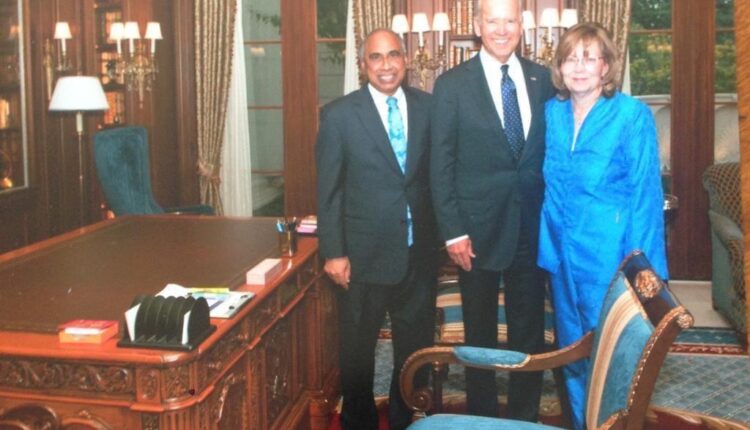America will have to pay for targeting campuses
F
or more than a century, the US has drawn some of India’s brightest minds in pursuit of world-class edu- cation. From BR Ambedkar, who went on to draft India’s Constitution, to business titans like Mukesh Ambani and Azim Premji, American universities have helped shape generations of Indian think- ers, builders, and changemakers. Today, however, under the Trump administra- tion’s increasingly hardline immigration policies, that legacy is being threatened. The consequences of these actions could reverberate for decades to come.
Americans wouldn’t even consider crimes, and certainly not college students.”
In certain instances, students were deported for traffic offences, including speeding, sometimes just five to ten miles over the limit.
There are many troubling aspects to the current crackdown on F-1 visa holders.
Most of the students impacted, accord- ing to reports, are from Asia, West Asia, or Africa, with Indian students making up the majority of them. This is not surprising
Frank F Islam
In recent weeks, reports from US campuses have sent a chill through the Indian student com- munity. Thousands of interna- tional students on F-1 visas have been detained, deported, or denied re-entry for seemingly minor infractions. According to the American Immigration Lawyers Asso- ciation (AILA), the records of more than 4,700 international students have been ter- minated by US Customs and Immigration Enforcement. Half of these students are estimated to be Indian nationals.
The reasons for these terminations range from immigration violations to alle gations of advocating pro-Hamas positions. It appears though the majority of the cases stem from interactions with law enforce- ment. Sharvari Dalal-Dheini, senior director of government relations at AILA, told CNN-News18 last week, “Many of the so-called crimes they were charged with or picked up for are things that everyday
since nearly 30% of all interna- tional students enrolled in US uni- versities are Indian nationals According to the Open Doors anal- ysis, of the approximately 1.13 mil- lion international students on F-1 visas during the 2023-2024 aca- demic year, nearly 332,000 were from India.
A recent AILA review of 327 visa revocation cases revealed that 60% involved Indian students. This disproportionate representation of Indian students is troubling. It suggests that these students are caught in the crossfire of an administration intent on restricting legal immigration, particu- larly from specific regions, under the guise of security and order. Much like the administration’s tariff policies, the crack- down on F-1 visa holders could have long- term negative consequences.
It is quite possible that a significant number of Indian students will choose to stay home or seek opportunities in coun- tries more welcoming to international tal- ent. That would not only be a loss for the
NANDS
OFF! HARVARD
The trust broken in classrooms today may take decades to repair.
REUTERS
cators, these students added $43.8 billion to the US economy in the 2023-2024 aca- demic year and supported 378,175 jobs across the country. Indian students alone might be contributing more than $10 bil- lion annually to the US economy through tuition, housing, and living expenses.
Universities themselves are feeling the strain. Even before this latest crackdown, enrollment of Indian students in US uni- versities had begun to decline due to tight- ening visa rules, hostile rhetoric, and ris- ing costs. Now, as stories of raids, deten- tions, and revocations circulate across WhatsApp groups and social media forums, this damage is accelerating. With alternatives like Europe and Australia increasingly seen as safer bets, the US is losing its reputation as a welcoming desti- nation for international talent.
students, but a setback for the US as well. To grasp the gravity of the current crack- down, one needs to look no further than the US tech industry. Two of the most influ- ential and consequential companies in the world-Microsoft and Google-are led by former F-1 visa holders: Satya Nadella and Sundar Pichai. In addition, tens of thou- sands of former international students now occupy leadership roles across the Ameri- can economy, from senior engineers and startup founders to university presidents and deans, strengthening institutions that help define the nation’s global edge.
The crackdown would not only have intellectual costs. It would also have eco- nomic costs for the US. International stu- dents contribute substantially to the US economy. According to research by NAFSA: Association of International Edu-
What began as a broad campaign of hos- tility toward immigrants-from the mass deportations of undocumented families to the demonisation of H-1B visa holders- has now turned university campuses from havens of learning into frontlines of suspi- cion. Sadly, for the US this moment tran- scends universities. At stake is nothing less than America’s identity. Historically, this immigrant nation- as John F Kennedy referred to the US-has flourished because of its openness to embracing immigrants of all types including the world’s dreamers, scholars, and builders. That openness is now under siege.
Unless it is reversed America will pay an enormous cost for this shortsightedness. The trust broken in classrooms today may take decades to repair. And, when the world’s brightest students stop knocking, the door may never open in quite the same way again.
Frank F Islam is an entrepreneur, civic leader, and thought leader based in Washington DC. The views expressed are personal
ICENCE NA VÍCN340001214 AIR SURCHARGE: Rainur and beyond by Rail or Road – Rs. 5/-, Ahmedabad, Bangalore, Coimbato







